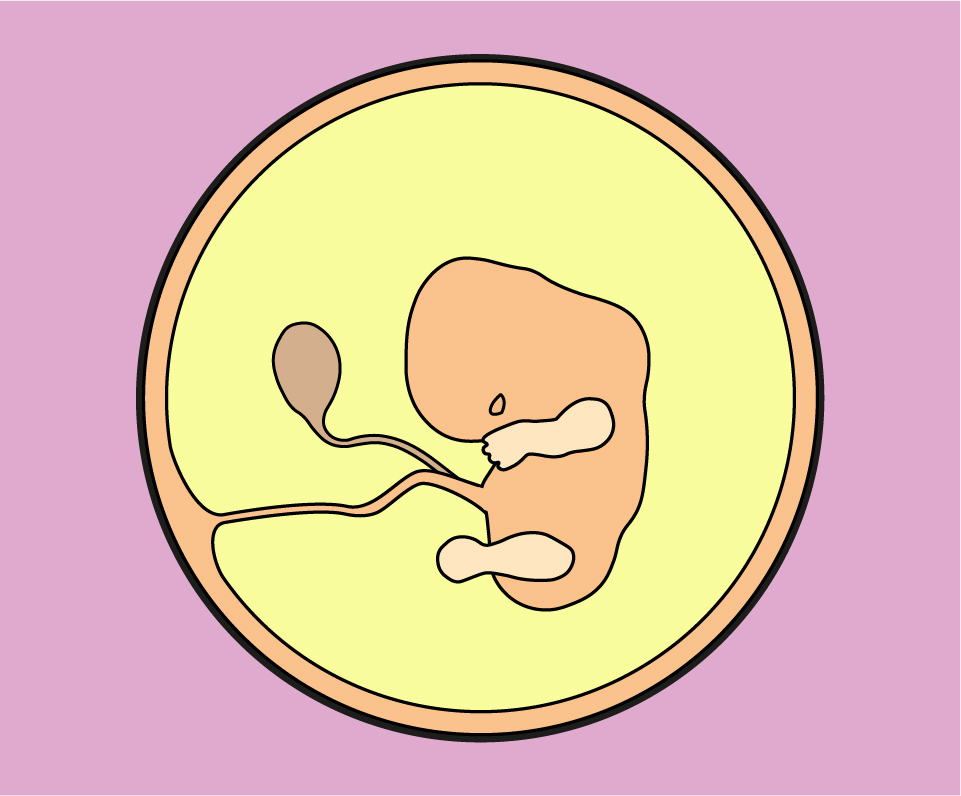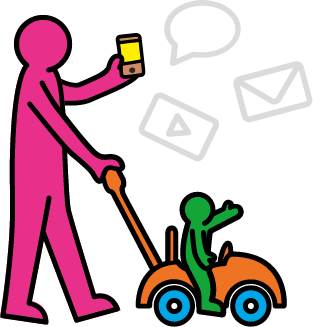Week-by-week guide to pregnancy

1st trimester
Our week-by-week pregnancy guide is full of essential information. From early pregnancy symptoms to how your baby is growing and developing, you'll find it all here.
Week 11 – your 1st trimester
You only have 2 weeks until you start your 2nd trimester. This is when many women start to "glow" and regain their energy as their hormones settle down.
You'll be offered a range of tests around now that will look at your blood, urine and blood pressure. These tests provide an opportunity to have yours and your baby's health checked. You can find out more about antenatal checks and tests on the NHS website.
What's happening in my body?
As you start to bulge out a bit, your muscles and ligaments will stretch, and this could give you pains around your stomach. If it hurts a lot, see your midwife or doctor as soon as possible.
Your body is now pumping around up to 50% more blood than usual. The blood feeds your womb, but it can also make you feel hot, sweaty and dizzy. That's your baby's way of telling you to rest.
Your baby has previously been fed by a yolk sac, but a new organ called the placenta is about to take over. The placenta will nourish the baby and remove waste. While the switchover happens, the hormones involved could make you feel tired and emotional.
Sign up for emails
Get more tips and advice on your pregnancy, baby and parenting sent to your inbox.
What to expect from your first scan
Hospitals in England usually offer 2 ultrasound scans during pregnancy. The first is a dating scan between 8 and 14 weeks. The sonographer (who takes the test) uses harmless invisible waves to build up a detailed picture of the inside of your womb. The test can include a nuchal translucency test (NT) that measures the fluid at the back of the baby's neck, as part of a screening process for Down's syndrome.
Early pregnancy symptoms (at 11 weeks)
You may be feeling very tired at the moment, but gentle exercise such as walking could help you feel better.
Your early signs of pregnancy could also include:
- aches and pains around your bump
- nausea
- mood swings
- a metallic taste in your mouth
- sore breasts
- indigestion and heartburn
- headaches
- dizziness
- new likes and dislikes for food and drink
- a heightened sense of smell
- a white milky pregnancy discharge from your vagina
- light spotting (see your doctor if you get bleeding in pregnancy)
- cramping, a bit like period pains
- darkened skin on your face or brown patches - this is known as chloasma or the "mask of pregnancy"
- greasier, spotty skin
- thicker and shinier hair
- bloating and the feeling of being bloated (read ways to cope with bloating on week 10's page)
Read Tommy's guide to common pregnancy symptoms.
What does my baby look like?
Your baby, or foetus, is now around 41mm long from head to bottom, which is about the size of a fig. The head is still supersized, but the body is growing quickly. The fingers and toes are separating out. There are tiny fingernails and miniature ears. Although your baby is kicking around inside your womb, you probably won't feel anything for several weeks.

Action stations
Start thinking about your birth plan – visit the NHS website for the tips and to download a birth plan template.
It's also a good time to do the following:
Share the news with your GP or ask for an appointment with a midwife at your doctors' surgery. Alternatively you can refer yourself to your local hospital – look for contact details on their website.
You'll need to arrange a booking appointment. This usually takes place between weeks eight and 12 and takes around an hour. You can talk about the options for your pregnancy and the birth. Plus you'll be offered screening tests for infectious diseases, and conditions such as Down's syndrome. You could ask about the Maternity Transformation Programme and how it could benefit you.
You will be offered your first dating scan at 8 to 14 weeks.
If it's your first pregnancy, you will probably have around 10 appointments and 2 scans in total.
Ask your midwife or doctor about online antenatal classes – they may be able to recommend one. The charity Tommy's has lots of useful information on antenatal classes and preparing you for birth.
Antenatal classes will give you the chance to meet other people and prepare you for parenthood. The NCT offers online antenatal classes with small groups of people that live locally to you.
Do your best to stop smoking, give up alcohol and go easy on the tea, coffee and anything else with caffeine. Ask your midwife or GP for support if you need it.
Take prenatal vitamins. You're advised to take 400 micrograms of folic acid, every day, until at least week 12. This helps your baby's nervous system to form and offers some protection from conditions such as spina bifida.
To keep bones and muscles healthy, we need vitamin D. From late March/early April to the end of September, most people make enough vitamin D from sunlight on their skin. However, between October and early March, you should consider taking a daily vitamin D supplement because we cannot make enough from sunlight.
Some people should take a vitamin D supplement all year round, find out if this applies to you on the NHS website. You just need 10 micrograms (it's the same for grown-ups and kids). Check if you're entitled to free vitamins.
Do you think you or your partner could have a sexually transmitted infection (STI)? If so, get checked out, as this could affect your baby's development. Talk to your midwife or GP, or visit a sexual health clinic.
It's recommended that you do 150 minutes of exercise a week while pregnant. You could start off with just 10 minutes of daily exercise - perhaps take a brisk walk outside. Check out Sport England's #StayInWorkOut online exercises (scroll to the pregnancy section). Listen to your body and do what feels right for you.
There's no need to eat for two. If you pile on the pounds, you could put you and your baby at risk of health problems such as high blood pressure. Eat healthily, with plenty of fresh fruit and veg, and avoid processed, fatty and salty foods. You may be able to get free milk, fruit and veg through the Healthy Start scheme.
If you have a long term health condition, then let your specialist or GP know that you're pregnant as soon as possible. Don't stop taking any regular medication without discussing it first with your doctor.
How are you today? If you're feeling anxious or low, then talk to your midwife or doctor who can point you in the right direction to get all the support you need. You could also discuss your worries with your partner, friends and family.
You may be worried about your relationship, or money, or having somewhere permanent to live. Don't keep it to yourself. It's important to ask for help if you need it.
You and your family should follow the government and NHS guidance on coronavirus (COVID-19):
To find out about about COVID-19 and pregnancy, childbirth and breastfeeding, have a look at advice on the:
Want to know when the baby's due?
Use the NHS pregnancy due date calculator. You'll get a more accurate date from your doctor or midwife when you have a dating scan (usually at eight to 14 weeks).

Sign up now for our pregnancy, baby and toddler guide
Get personalised emails for trusted NHS advice, videos and tips on your pregnancy week by week, birth and parenthood.